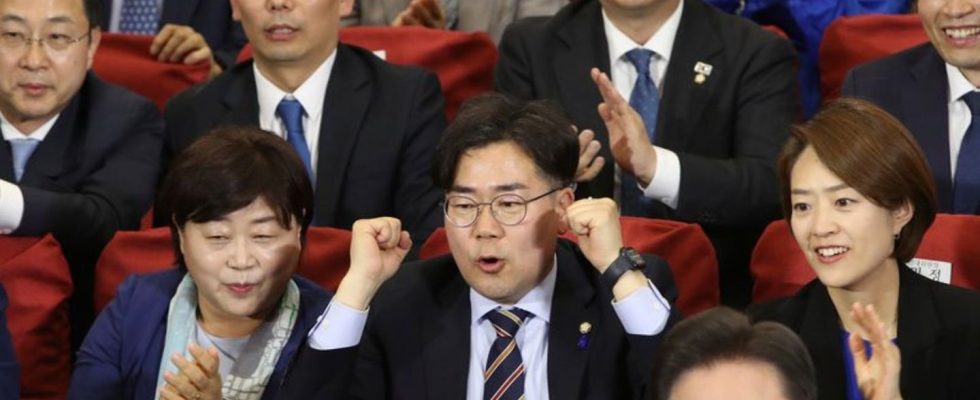East Asia
South Korea’s opposition clearly wins parliamentary election
Opposition leader Lee Jae Myung and other members of the Democratic Party (DP) react to the announcement of voter polls after the general election. photo
© Chung Sung-Jun/Pool Getty Images AsiaPac/AP/dpa
The parliamentary election in South Korea was seen as an interim test for the government. However, the president’s party is clearly failing to achieve its goal of changing the balance of power in parliament in its favor.
Opposition leader Lee Jae Myung’s Democratic Party (DP) maintained its position as the largest single party in the 300-seat National Assembly, South Korean broadcasters reported. Due to the opposition’s success in the election, the conservative head of state is now in danger of becoming largely incapable of acting domestically during his remaining three years in office.
After counting more than 90 percent of the votes in 254 electoral districts, the DP could reportedly expect to win 160 seats. Yoon’s People Power Party (PPP) would therefore be represented by 91 MPs in the future.
In addition to the direct mandates, 46 seats are awarded to list candidates based on the proportional share of votes in the election, which takes place every four years.
Difficult power relations
In Asia’s fourth-largest economy, the success of the opposition heralded a continuation of the difficult political balance of power. Yoon’s party had hoped for a shift in power in her favor so that she could more easily push through legislation. PPP leader Han Dong Hoon had already expressed disappointment over the results of post-election polls by various broadcasters, which had predicted an overwhelming victory for the opposition. Experts spoke on television of an impending disaster for the government camp.
The election was seen as an important interim test for the government under Yoon. The next presidential election is scheduled for 2027. Yoon, who won the election two years ago narrowly ahead of DP Chairman Lee, can no longer be re-elected. According to the country’s presidential constitution, Yoon can continue to govern with a majority of the opposition in parliament, as before. But in this case, important government legal reforms can be blocked.
The election campaign was characterized by mutual attacks between the parties. The DP and other parties called for a verdict to be passed on the government, which they accused of economic incompetence in view of rising prices for food and other goods. The PPP asked voters to vote to support the government’s reform policies and keep the opposition in check.
More than 44.25 million citizens were called to cast their votes in the election on Wednesday. According to preliminary information from the State Election Commission, turnout was 67 percent. This was the highest number in a parliamentary election in 32 years.

